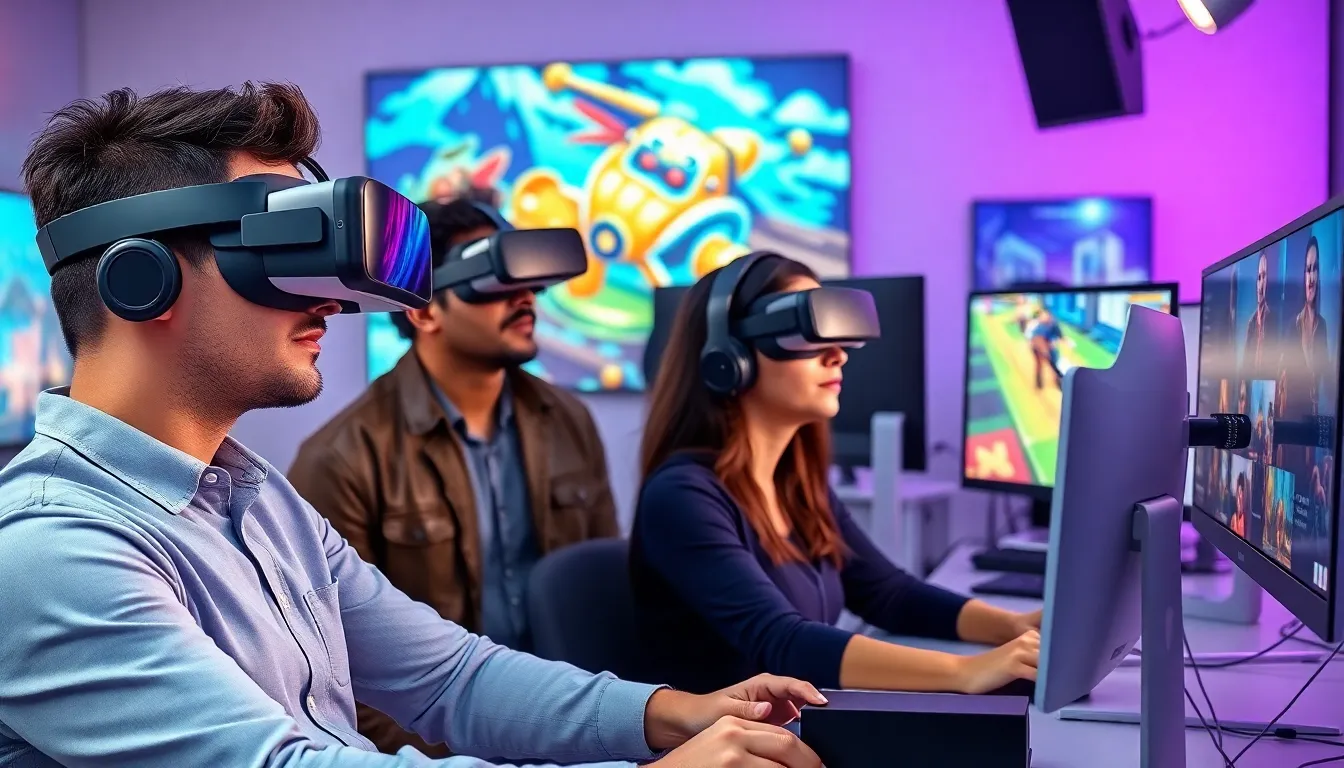Table of Contents
ToggleImagine slipping on a headset and stepping into a world where your office is a spaceship, your colleagues are holograms, and the coffee is always perfect. Welcome to the realm of virtual reality jobs, where the lines between work and play blur into an exhilarating experience. As technology evolves, so do the opportunities, opening doors to careers that once only existed in sci-fi movies.
Overview of Virtual Reality Jobs
Virtual reality jobs encompass a variety of roles that leverage immersive technology. Designers create engaging virtual environments and experiences. Developers build software applications and tools used in VR settings. Artists produce 3D models and animations to enhance the realism of virtual spaces.
Numerous industries utilize virtual reality, including gaming, healthcare, education, and real estate. In gaming, professionals design interactive worlds that captivate players. Healthcare uses VR for training doctors and treating patients, enabling safe simulations of complex procedures. Education incorporates virtual environments to provide experiential learning, offering students unique opportunities.
Many companies seek skilled individuals for emerging roles such as VR technical artists, UX designers, and software engineers. VR technical artists bridge the gap between art and technology, ensuring that visual elements function seamlessly within applications. UX designers focus on creating user-friendly interactions, optimizing the overall experience.
Data shows that the job market for VR positions is expanding rapidly. Reports indicate an expected growth rate of 48.8%, reaching a valuation of $57.55 billion by 2027. Such statistics underline the increasing demand for professionals in this field.
The future landscape of virtual reality jobs appears promising. Collaboration among artists, engineers, and industry professionals fuels innovation and growth. Active participation in VR communities and continuous learning enhance skills, providing a competitive edge.
Types of Virtual Reality Jobs

Virtual reality jobs span various industries, creating numerous opportunities for skilled professionals. The following sections detail specific roles within the VR landscape.
Game Development
Game development focuses on creating immersive environments and interactive gameplay experiences. Developers work with graphics engines like Unity and Unreal Engine to build engaging worlds. Game designers craft the game’s mechanics, while artists produce stunning visual elements, including 3D models and animations. The gaming industry continues expanding, with a projected growth of $197.4 billion by 2025. Game testers also play an essential role by providing feedback on gameplay experiences, ensuring overall quality.
Education and Training
Education and training harness virtual reality to create immersive learning environments. Educators use VR simulations to enhance student engagement and improve knowledge retention. Subjects like science and history can come alive through interactive experiences. Corporate training programs also utilize VR for onboarding and skill development. Companies see increased efficiency and higher engagement levels with VR-based training compared to traditional methods. A study indicated that VR training may lead to a retention rate of up to 75%, significantly higher than conventional training techniques.
Healthcare and Therapy
Healthcare employs virtual reality to revolutionize patient treatment and training. Medical professionals utilize VR for surgical simulations, allowing trainees to practice in a risk-free setting. Therapy also integrates VR to treat conditions like PTSD and phobias, creating controlled scenarios for exposure therapy. Studies reveal that VR-assisted therapy can reduce symptoms effectively, with patients showing significant improvement over traditional methods. Telehealth services benefit from VR applications, enhancing remote consultations and patient engagement.
Skills Required for Virtual Reality Jobs
Virtual reality jobs demand a mix of both technical and soft skills to succeed in a rapidly evolving landscape. Professionals in the field find that mastering these skills enhances their career growth and job performance.
Technical Skills
Proficiency in programming languages like C# and C++ serves as a foundation for many VR roles. Familiarity with game engines such as Unity and Unreal Engine enhances the ability to create immersive environments effectively. Understanding 3D modeling software, including Blender and Maya, aids in the production of high-quality assets. Knowledge of VR hardware, including headsets and motion tracking devices, ensures compatibility and functionality across platforms. Experience with user interface design principles improves the overall user experience in applications and games.
Soft Skills
Effective communication enables collaboration among diverse teams, crucial in VR development. Creativity sparks innovative solutions and unique designs that captivate users. Problem-solving skills help tackle technical challenges that arise during the development process. Adaptability remains vital as technology continues to evolve, requiring frequent updates to skills. A strong attention to detail ensures high-quality outputs and enhances the user experience, proving that thorough work significantly elevates project success.
The Future of Virtual Reality Jobs
The future of virtual reality jobs promises rapid expansion and diversification. New technology creates opportunities in various fields, enhancing collaboration and creativity. Industries such as gaming, healthcare, and real estate rely on VR’s immersive capabilities, continually reshaping work environments.
Projected job market growth indicates an increase of 48.8%. By 2027, the industry valuation could reach $57.55 billion. This increase in demand leads to the emergence of roles like VR technical artists, UX designers, and software engineers. Companies seek skilled professionals to develop innovative applications and experiences.
Game development plays a significant role in this evolution. Interactive gameplay and immersive environments draw users in, utilizing graphics engines such as Unity and Unreal Engine. The gaming industry itself is expected to grow to $197.4 billion by 2025, indicating robust job opportunities.
Education sees VR enhancing learning and engagement. Simulations improve knowledge retention, with studies showing VR training can achieve a retention rate of up to 75%. Learning institutions increasingly incorporate VR into their curricula, further driving job demand in this sector.
Healthcare transforms thanks to virtual reality as well. VR applications include surgical simulations and effective therapies for PTSD, providing realistic training experiences. Telehealth services gain efficiency through VR, creating roles focused on these innovative applications.
Essential skills align with the evolving landscape of virtual reality jobs. Expertise in programming languages like C# and C++ proves valuable for developers. Familiarity with game engines and 3D modeling software stands necessary for success. Soft skills such as effective communication, problem-solving, and adaptability also contribute to career growth in this dynamic field.
The landscape of virtual reality jobs is evolving rapidly and offers a wealth of opportunities across various industries. As technology advances the demand for skilled professionals continues to grow. Those interested in this field should focus on developing both technical and soft skills to thrive in an increasingly competitive job market.
With VR’s potential to transform work environments and enhance productivity, professionals are encouraged to embrace continuous learning and adapt to new challenges. The future is bright for those willing to explore the limitless possibilities that virtual reality presents. As industries harness the power of immersive experiences, the potential for innovation and career growth remains unparalleled.




